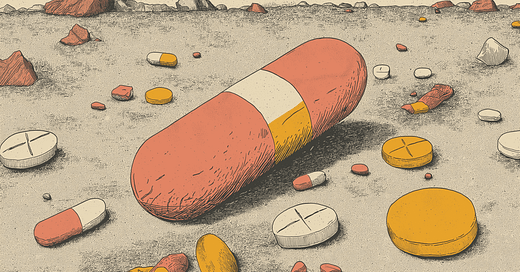America’s war on drugs has spanned more than half a century, cost more than a trillion dollars, and incarcerated millions. And yet, despite the rhetoric, the slogans, and the evolving policies, we find ourselves staring down a public health and public safety crisis that feels worse than ever.
The drugs are different now. The stakes are higher. And the same old thinking won't solve it.
Over the years, we’ve watched the conversation shift—slowly, painfully—from one of zero tolerance to one of harm reduction. Marijuana is now legal in most states in some form. Psychedelics are being explored for their therapeutic potential. Even once-taboo substances like MDMA and psilocybin are entering mainstream medical discourse. We've matured in our understanding that not all drug use is equal, and not all drug policy should be punitive.
That evolution is a good thing. But it has also, in some corners, led to a kind of numbness—an assumption that all drugs, and all drug policy, should be met with the same leniency and understanding.
They shouldn't.
Because somewhere along the way, amid debates about cannabis taxation and mushroom therapy, we lost sight of a different kind of drug crisis—one that's far more dangerous and far less forgiving.
Methamphetamine. Heroin. Fentanyl.
These are not soft drugs. They do not exist on the margins of recreational culture. They destroy people quickly and completely. The difference is not just in degree—it's in kind. These substances are not simply about escape; they are about devastation.
Fentanyl, in particular, has reshaped the American overdose crisis. It's cheap to produce, easy to smuggle, and potent enough that a dose the size of a few grains of salt can kill. It's showing up not just in heroin but laced into counterfeit pills, cocaine, even marijuana—turning casual use into a game of Russian roulette. In 2023 alone, more than 100,000 Americans died from drug overdoses. The overwhelming majority involved synthetic opioids like fentanyl.
We cannot arrest our way out of this. That lesson has been learned, and painfully so. Mass incarceration didn’t solve drug abuse. It ruined families, communities, and trust in the system. But swinging the pendulum too far in the other direction—treating all drug enforcement as oppressive or outdated—isn’t the answer either.
We need a new model. A more focused, surgical response. One that makes a clear distinction between drug use and drug trafficking. Between substances that can be managed, even regulated, and substances that are fundamentally destructive.
I’m not advocating for a new war on drugs. I’m calling for a targeted strategy that zeroes in on the production, trafficking, and distribution of meth, heroin, and fentanyl—the drugs that are currently doing the most damage to American lives.
That means treating high-level traffickers not as street criminals, but as international threats. It means elevating this crisis beyond the Department of Justice and into the realm of national security. The flow of fentanyl from labs in China and cartels in Mexico is not just a law enforcement issue—it’s a geopolitical one. The response should reflect that.
At the same time, we need compassion, not punishment, for those struggling with addiction. This is not about filling prisons with users. It’s about dismantling the systems that feed addiction before it starts—by choking off supply and replacing it with support.
That includes expanding access to treatment centers, building out mental health infrastructure, funding recovery programs, and addressing the underlying social and economic despair that so often fuels substance abuse. It also means investing in education, community outreach, and early intervention—long before someone ends up in an ER or on a street corner.
To do this right, we must abandon the binary thinking that has plagued drug policy for decades. This isn’t a choice between harsh crackdowns or open permissiveness. It’s a call for discernment. For prioritization. For separating the manageable from the catastrophic.
There’s room in this country for a thoughtful, evolving conversation about drugs. About legalization, regulation, decriminalization. But that conversation should not blur the line between what’s dangerous and what’s deadly. Meth, heroin, and fentanyl aren’t part of that debate. They’re a crisis in their own category.
Let’s stop pretending that a universal policy will solve this. It won’t. What we need now is not a louder war cry—but a wiser one. A strategy that is precise, principled, and rooted in both justice and humanity.
We owe it to the lives already lost—and to those still fighting to survive.
If we’re going to turn the tide on addiction, we have to stop fighting the wrong war. This isn’t about being tough or soft on drugs—it’s about being smart, clear-eyed, and humane. It’s about knowing the difference between what can be healed and what must be stopped.
The stakes are too high for lazy thinking or outdated slogans. We need strategy. We need leadership. And we need the courage to say that doing nothing—out of fear of controversy—isn’t an option.
If this message resonated with you, share it. Start the conversation. Because behind every overdose statistic is a real person, and behind every recovery is a chance to rebuild something better.
Subscribe for more, and as always—stay principled, stay engaged, and let’s fight the right fight.
Until next time.












Share this post